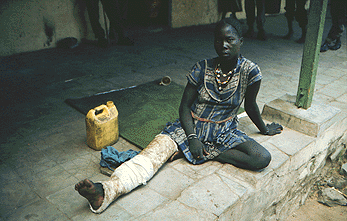
The devasting effects of years of civil war as experience
Photo by Nils Carstensen/ACT
by the people of the Southern Blue Nile, Sudan
Click on the photo to order (ref. Sudan/ACT 06)

|
Delegates to the eighth assembly heard several impassioned pleas for the World Council of Churches
to take action on behalf of the suffering people of Sudan. For most of the country's history since its independence over 40 years ago, it has been ravaged by civil war. The major divide is between the largely Muslim North, where the government in Khartoum has implemented Islamic law, and the largely Christian or animist South. But as the war has dragged on, ethnic and factional infighting has compounded the suffering of the people of the South. Human-rights observers accuse Sudan's government of using torture and a revived slave trade to subdue the southern Sudanese. Relief agencies claim the regime is creating severe famine in the South by blocking food shipments. |
| A week after Bishop Taban returned to Sudan, the WCC received word that 14 bombs had exploded in the town of Narus near the cathedral he serves. The bishop was not hurt, but six other people were said to have been killed and 14 seriously wounded. Reports indicated the bombing was carried out by units of the Sudanese army in retaliation for the bishop's outspoken appeal to the WCC. Konrad Raiser, general secretary of the WCC, sent a letter of protest to Sudan's minister of foreign affairs, urging him to ensure Paride's "absolute personal security, and to identify and bring to justice the perpetrators of this terrible act". |
| "Many Christians are being tortured and killed," Benjamin said. "They are being martyred because they will not renounce their Christian faith and accept Islam." |
© 1999 world council of churches | remarks to webeditor